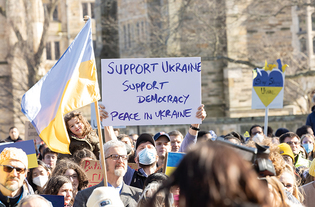
Dan Renzetti
Hundreds of people joined a rally on Cross Campus at the end of February to show their support for Ukraine.
View full image
What you’re reading here was written seven or eight weeks ago. Most bimonthly magazines aren’t produced quickly, and it doesn’t help that supply chain links keep breaking. As I write, I’m hoping that what I’m writing about will be done and over by the time you’re reading this: that you’ll glance at it and turn the page, because Ukraine will have already won the war.
But it’s painfully unlikely. So let me tell you about three Yale students I talked with who were born in Ukraine, who have relatives in Ukraine, and who worry.
Yuliia Zhukovets ’23, who speaks Ukrainian, Russian, Turkish, Spanish, and English, was “born and raised in Ukraine, and only came here for college.” Her family is still there. “I don’t think I’ve ever experienced anything like this,” she said. “It was very emotional, a lot of anxiety and basically no sleep. When the bombing started, my parents were still in Kyiv,” and no one knew how soon the Russians would start destroying cities. Her family left Kyiv and traveled nonstop for 24 hours.
But they’re fortunate. They own a hotel in the far western mountains, and by the time I spoke with Yuliia, her family was living there. She’s “very grateful for that,” and she wanted to act, to call attention. She planned a rally, recruited friends to advise and help her, and soon found herself texting back and forth with Yale administrators. The hundreds of rally attendees on Cross Campus included President Peter Salovey ’86PhD, Mayor Justin Elicker ’10MBA, ’10MEM, and US Senator Richard Blumenthal.
She’s trying to stay optimistic. Still: “I do think that it’s a conflict for a long time. We will need many more years to recover from this.”
Yevhenii Monastyrskyi ’23MA is a historian by training and vocation, but after the 2014 Russian invasion—when he had to flee his hometown—he also became “what I like to call ‘accidental sociologist.’” He has served for many different organizations, including UN missions to Ukraine, UN institutions to Ukraine like UNDP, UN Women, UNHCR, and more. Yevhenii serves Ukraine, he says, with his skills in analysis, communications, and international humanitarian law. He missed three days of class recently in order to argue at the UN on Ukraine’s behalf.
Friends of his are fighting in the war; a few of them have died. His brother is a veteran of the Ukrainian armed forces. “The only thing I can say is, eventually we will win. We are already winning, because this is our independence war, and this is our sovereignty war. It’s very hard to fight people who fight for their life. It’s our country, it’s our freedom, and we will fight for every bit of it.”
Sofiya Bidochko ’24, born in Lviv, came to the US with her parents when she was two. Everyone else in her extended family is in Ukraine. “It’s like learning to live with a pit in your stomach every day,” she said. “But you’re trying to go on and complete all your normal duties, because I know what my family in Ukraine wants me to do.”
Sofiya is double majoring: economics and molecular, cellular, and developmental biology. Next, she’ll attend law school, to learn intellectual property law in biotechnology—and immigration law, because she has seen how difficult it has been for Ukrainian refugees. She has learned, she says, how to do her work and stay disciplined, “when parts of my life are really crashing down. I always have the CNN Ukraine updates running. In between classes I’m automatically just checking my phone, nervous that I’m going to find that missiles were hitting the locations my family’s still in.”
I asked if she cries. Yes, in the beginning, she said. “Now, I’ve kind of become numb.” But Ukrainians are “holding onto their hope, and I’m holding onto mine. We need to remember to not stop using our voices, protesting, boycotting goods that are fueling Russia, calling local officials, making donations. Because Ukraine is willing to fight, but seeing that the world is behind them, seeing how many people are on their side: that’s what’s keeping them going. So hold onto hope. For yourself, and to keep Ukrainians hoping.”
 loading
loading